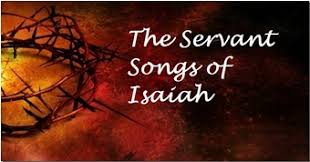I thought we had a wonderful gathering last week. This Tuesday, we will be looking at excerpts from Isaiah 42:18-49:18, with an emphasis on the Second Suffering Servant Song of Isaiah 49:1-6. I have attached North’s short commentary on this Second Servant Song for a good brief overview of this Song from his book The Suffering Servant – An Historical and Critical Study. pp. 142-46. I have also attached North’s chapter on “Summary and Conclusion” which discusses the historical identity of the servant. pp.192-219.
As you read through the Isaiah verses this week, there are a few points to focus on. First and foremost is God’s pronouncement that our transgressions are trivial and insignificant compared to his love for us. The exile and the estrangement are caused by sin, and yet God pronounces that He blots our transgressions, and no longer remembers our sins. Isa. 43:25. It is He who sweeps away our transgressions like a cloud, and our sins like a mist. Isa. 44:22. God does this because it is he who made us. Isa. 44:2. We are precious in his sight and God loves us. Isa. 43:4. This is the Gospel in a nutshell. This is what the prophet proclaims and looks forward to.
A second point to look at is the prophet’s treatment of Cyrus of Persia. The Hebrew Scriptures (they have a different book order than we do) end with Cyrus’ proclamation that the exile was over and that the Jews could return to Jerusalem and rebuild the Temple. 2 Chron. 36:23. The prophet calls Cyrus his Anointed One (messiah) and the shepherd of his people. Isa. 44:28-45:1. God’s restoration of his people is brought about by a foreign pagan king. This elevation of Cyrus shows that God’s freedom is boundless and that God is not constrained to act in a certain way to bring about the salvation of his people.
Finally, the prophet emphasizes God’s freedom to act by using the analogy that God is the potter and we are the clay. Isa. 45:9. This same analogy is used in Isaiah 64:8 where it means that it is God who molds and transforms us. However, here the analogy is used to emphasize that it is God who acts and that God can bring about his people’s restoration as he chooses. The clay lacks the right to question the potter as to what he is doing and the manner in which he is doing it. We saw this in the Gospel reading last week where Peter rebukes Jesus for saying that he (Jesus) must suffer and die. Mark 8:31-38. It is our nature to tell God what he must do and how he must do it, and yet the prophet reminds us that we are the clay and not the potter, and it is not for us to fashion a god to our liking.
Dinner is at 6. The menu is turkey arayes. Discussion about 6:45. Hope to see you here.
Fear not, for I have redeemed you;
Isaiah 43:1b-3a
I have called you by name, you are mine.
When you pass through the waters I will be with you;
and through the rivers, they shall not overwhelm you;
when you walk through fire you shall not be burned,
and the flame shall not consume you.
For I am the Lord your God,
the Holy One of Israel, your Savior.

